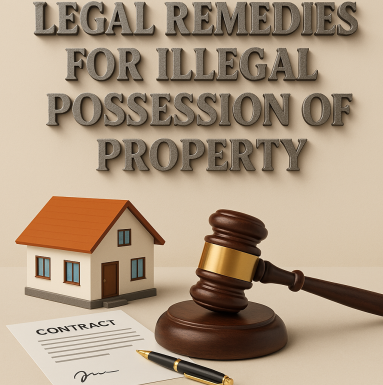
Legal Remedies for Illegal Possession of Property
Owning a property in India comes with its fair share of challenges — one of the most distressing being illegal possession. It’s not uncommon to hear about properties being encroached, occupied by unauthorized persons, or transferred through fraudulent means. Whether you are a landlord, buyer, or legal heir, discovering that someone else has taken control of your property without your consent can be both emotionally and financially devastating.
Fortunately, Indian law provides robust legal remedies to address such unlawful occupation. In this article, we’ll explore in detail the options available to property owners, the process to initiate action, and how Legals365 can support you through every step of the fight to reclaim your legal rights.
Understanding Illegal Possession of Property
What Constitutes Illegal Possession?
Illegal possession refers to a situation where a person occupies land or property without the legal authority, ownership rights, or permission from the rightful owner. This can happen in several ways:
Encroachment by neighbors on boundary areas
Tenants refusing to vacate even after the lease expires
Forgery in documents leading to unauthorized transfer
Possession by distant relatives without a will
Land grabbing by goons or mafias in urban/rural zones
Real-Life Example:
Mr. Sinha, an NRI, returned to India after five years to find his flat in Delhi occupied by an unknown family. The documents were forged, and his absence was exploited. Such scenarios highlight the need for timely legal intervention.
Legal Remedies Available to Property Owners
1. Civil Suit for Possession
A property owner can file a civil suit for possession under Section 6 of the Specific Relief Act, 1963. Even a person in possession without ownership, if dispossessed unlawfully, can file such a suit.
Key Points:
Must be filed within 6 months of dispossession
No need to prove ownership, only possession
Remedy available even against the actual owner if the possession was disturbed unlawfully
2. Suit for Injunction
To restrain someone from interfering with possession, a person can file a suit for permanent or temporary injunction under the Civil Procedure Code (CPC).
Types:
Temporary Injunction (Order 39 CPC): Grants interim protection
Permanent Injunction (Section 38 of Specific Relief Act): Provides long-term relief
3. Filing a Police Complaint (Criminal Remedy)
If illegal possession involves criminal acts like trespass, forgery, or intimidation, the affected party can file an FIR under the Indian Penal Code (IPC):
Section 441 IPC: Criminal trespass
Section 447 IPC: Punishment for trespass
Section 420 IPC: Cheating and fraud
Section 506 IPC: Criminal intimidation
4. Eviction of Tenants
If a tenant refuses to vacate after the agreement expires or violates terms, the landlord can:
Send a legal notice
File an eviction suit under Rent Control Acts applicable in the respective state
Approach the Small Causes Court for relief
5. Adverse Possession — A Double-Edged Sword
While adverse possession can be claimed by illegal occupants who stay undisturbed for over 12 years, it also gives clarity to legal owners to act before this period lapses.
Hence, time-bound action is crucial.
Legal Procedures to Reclaim Possession
Step 1: Collect Documentary Evidence
Title deed, registry papers
Utility bills in your name
Photos, communication records
Step 2: Send a Legal Notice
Drafted by an advocate
Serves as official intimation and evidence in court
Step 3: File Appropriate Suit
Depending on the situation:
Civil suit for possession
Injunction suit
Criminal complaint (FIR)
Step 4: Appear in Court with Legal Representation
Evidence presentation
Witness examination
Legal arguments
Step 5: Execution of Court Orders
Once the court rules in favor, execution orders can be passed to:
Evict the illegal occupant
Seize possession with police assistance
How Legals365 Can Help
At Legals365, we specialize in property law disputes and understand the sensitivity and urgency of illegal possession cases.
We offer:
? Verified Property Lawyers across India
? Drafting & Sending Legal Notices
? Filing Civil or Criminal Suits
? Court Representation & Evidence Management
? 24x7 Consultation & Case Updates
? Support in Documentation & Title Verification
Don’t let someone unlawfully enjoy what’s legally yours. With Legals365, reclaiming your property is just a few steps away.
???? Visit www.legals365.com to get started today.
Illegal possession of property is more than a legal nuisance — it’s a breach of rights, trust, and personal peace. But remember, Indian law strongly supports rightful owners and offers various legal avenues to reclaim your property.
From filing civil suits and injunctions to initiating criminal complaints, the law provides multiple shields. The key is acting swiftly and strategically — with the right legal counsel.
Let Legals365 guide you through this with expertise and empathy. Because justice delayed doesn’t always have to mean justice denied.
#IllegalPossession #PropertyDisputeIndia #LandEncroachment #Legals365 #PropertyRightsIndia #LegalRemedies #PropertyLawyerIndia #EncroachmentHelp #BreachOfPossession #IndianPropertyLaw #CourtCasesIndia #LandGrabbingLaw #ReclaimYourLand #LegalHelpIndia #PropertyLitigationSupport
Legals365 offers comprehensive, expert support for all yourLegal Remedies for Illegal Possession of Property needs. Our experienced team of legal professionals provides tailored guidance to help you navigate the complexities of Legal Remedies for Illegal Possession of Property cases with confidence. Whether you need assistance with documentation, court representation, or strategic planning, Legals365's Legal Remedies for Illegal Possession of Property services are designed to protect your interests and achieve the best outcomes. We handle every Legal Remedies for Illegal Possession of Property case with professionalism and dedication, ensuring that you receive personalized, client-focused support. Trust Legals365 for all your Legal Remedies for Illegal Possession of Property needs, as we work tirelessly to deliver results that make a difference.
Contact Us Today:
📱 Email: advocates@legals365.com
📞 Phone: +91 9625972356
Choose Legals365 for trusted, client-focused legal support in Legal Remedies for Illegal Possession of Property and beyond. Feel free to ask any question for free or explore answers to questions asked by live users.


